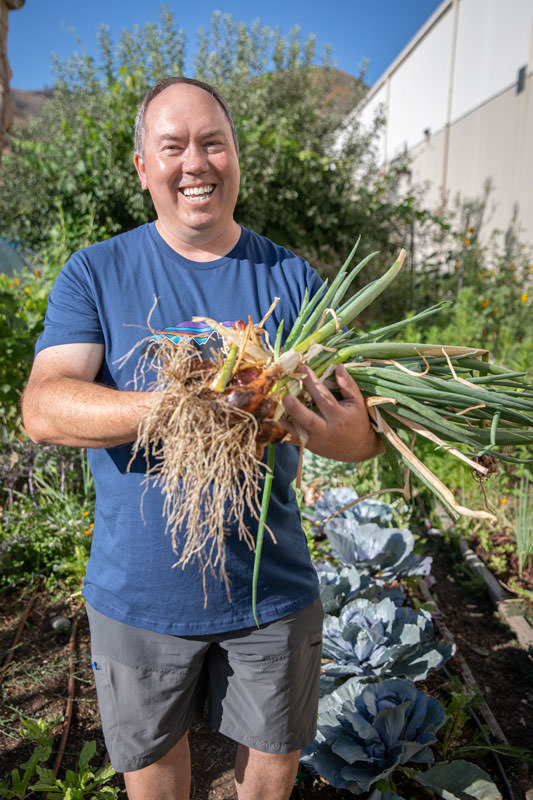NO SPACE WASTED
Patagonia and River School Farm grow food for employees at Reno Distribution Center.
Written by Claire McArthur
Photos by Shaun Hunter
Located on the banks of the Truckee River, Patagonia’s Reno Distribution Center is not your average workplace.
In order to facilitate a more inclusive environment, the building does not include individual offices. Employees enjoy paid volunteer days and can apply for environmental internships, which enable people who’ve been with the company for at least a year to go work for two months at a nonprofit while still receiving a salary. Patagonia also offers on-site subsidized child care.
One of the center’s parking lots doubles as a pollinator garden. And on nearly a quarter acre of land around the facility, a food forest, hoop houses, and grow tunnels farmed by neighboring River School Farm provide year-round produce to help supply the employee café.
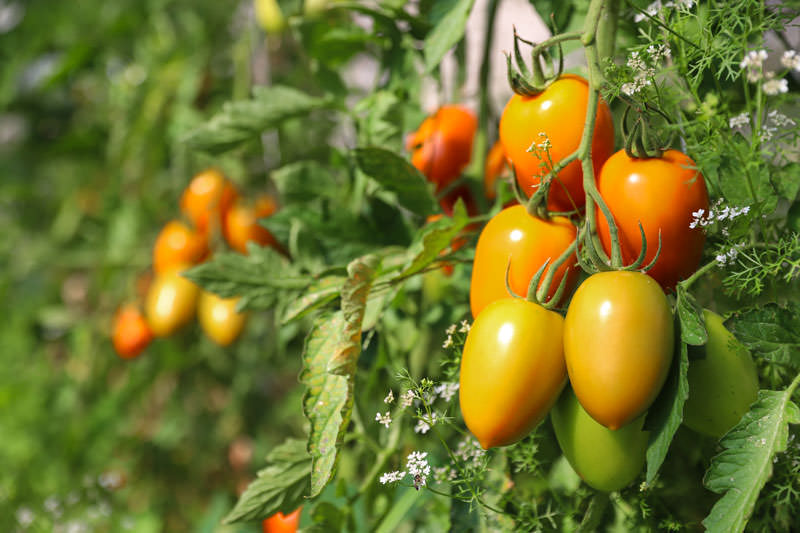
Tomatoes grow at the Patagonia garden
Staff Eats
“It got started when we initially built a food forest for Patagonia around 15 years ago. It’s a permaculture practice where you grow fruit trees, and then under the fruit trees you have berry bushes, and under the berry bushes you have plants like rhubarb, asparagus, and strawberries,” explains Tom Stille, co-founder and co-owner of River School Farm with his wife, Iris.
The farmable land continued to expand as the Stilles worked to produce more food for the Patagonia employee café, which opened a decade ago. In the warmer months, Tom farms tomatoes, peppers, cucumbers, and squash, while in the rest of the seasons he focuses on cool-weather crops such as arugula, spinach, lettuce, chard, turnips, beets, and bok choy.
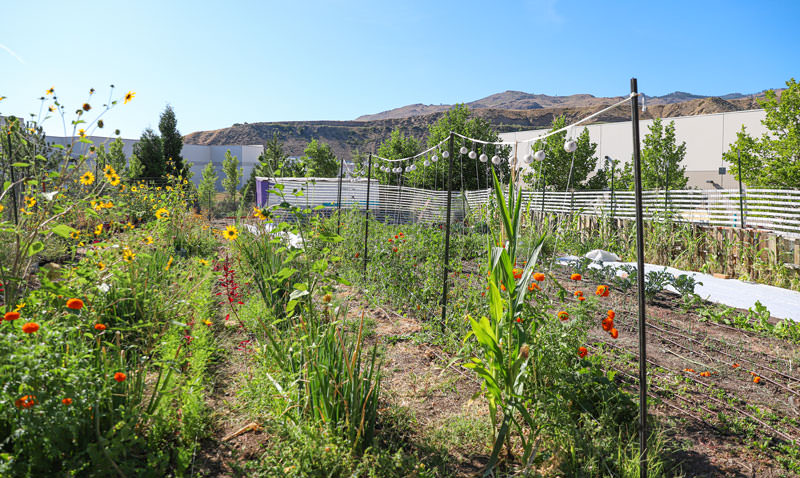
The garden behind the Patagonia Distribution Center
Patagonia provides the land and water, and, in exchange, the River School team tends the crops and sells the organic produce to the company.
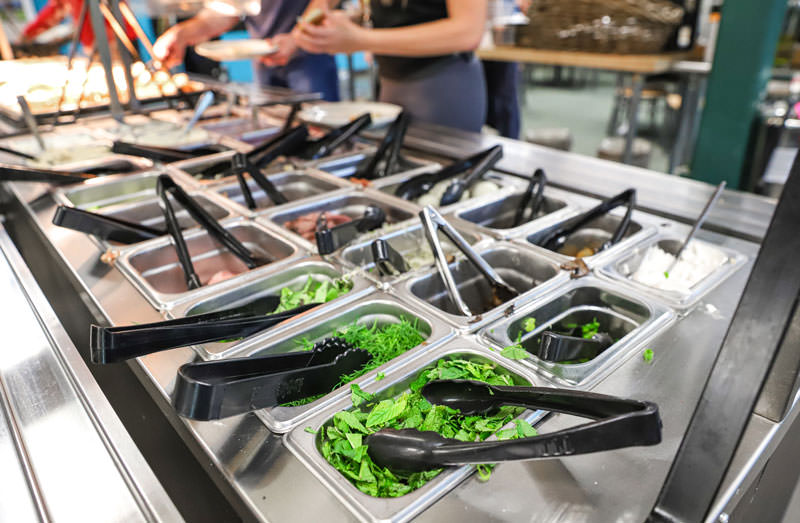
Patagonia’s cafeteria serves herbs and produce grown in its organic garden
“The whole intent is that an employee could run up the road and get food at one of the fast food places on McCarran (Boulevard), or they can have a really healthy meal here in alignment with our sustainability practices,” explains Chris Joyce, director of distribution at Patagonia. “Unlike a grocery store, where fresh greens can be some of the most expensive things you buy, a big, hefty salad here will cost you less than a sandwich, right around $4 to $5 for a healthy meal.”
The educational component and observance of the cycle of farming is enriching for employees, too, Joyce says.
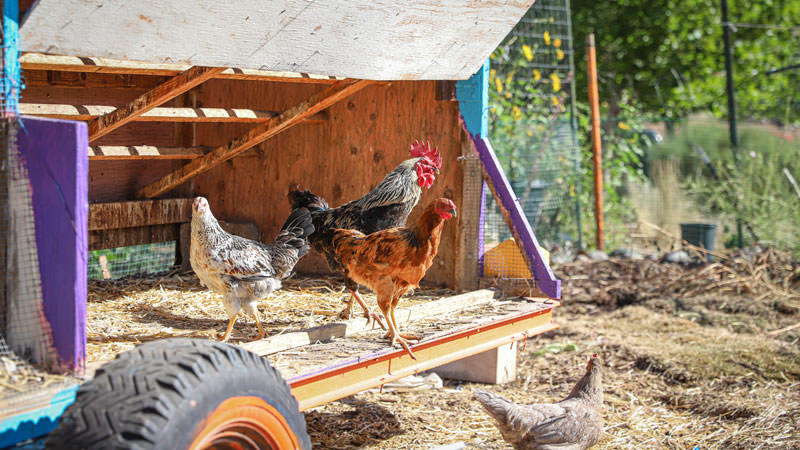
Chickens provide compost manure for the garden
On site, Tom raises about 25 hens that produce manure, which he mixes with Patagonia’s food waste and landscape clippings from property maintenance to create compost, which is put back in the soil.
“From the fuel-reduction program, we take all of those woody plants and trees that we might have to take out for fire safety, and we chip those to make mulch to protect our soils,” Tom explains. “We are constantly trying to be better farmers and become more efficient at producing. This starts with our soils, and with recognizing that rather than feed the plants, we feed the soil and work with microorganisms and compost tea to increase our production on the land that we have now.”
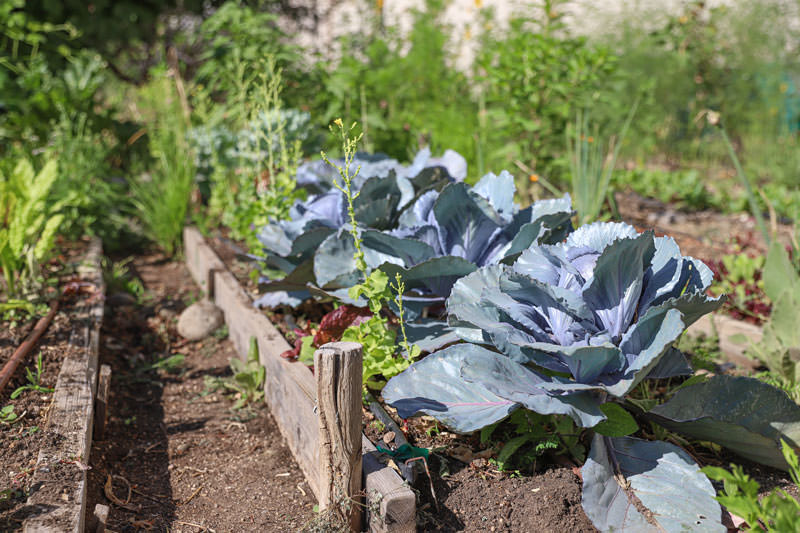
Cabbage grows in the garden
For Patagonia, having regenerative organic farming at the distribution center is another way for leaders to make sure the company is not just talking the talk when it comes to supporting the environment and a healthy lifestyle.
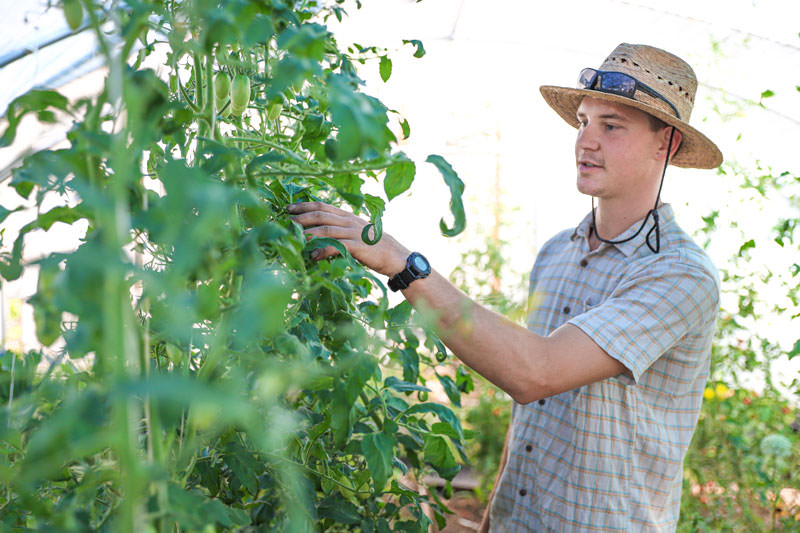
River School farmer Tanner Petrilla works with the tomato vines in the garden greenhouse
“As employees walk up to the building, there is composting going on near the path, so you get to see farming in action. There are chickens out front, and the children at the child development center get to interact with actual chickens and see where food comes from,” Joyce notes. “There’s this pride that it’s not just this big dead lot here. The acreage that is not being used commercially is producing food and providing habitat for animals and honeybees in the area. It allows us to be more in tune with the actual environment itself.”
Claire McArthur is a freelance writer who wishes more companies would adopt on-site farms to nourish their employees both physically and mentally through the simple act of growing food.
COVID-19 Impact
With only a small team of employees working out of the Reno Distribution Center due to COVID-19, the cafe currently operates on a limited basis to turn out healthy food for those people working in the office. However, Patagonia chef Dan Carter has been buying bulk grocery essentials that may be hard to find, such as yeast, flour, and organic eggs, for employees to come by and purchase once a week. Farmers Tom and Iris Stille also bring fresh, organic produce for the employees to buy.
The cafe’s operations have “diminished due to COVID,” says Chris Joyce, director of distribution at Patagonia, “but it still is producing food and making a difference for the Patagonia team.”
